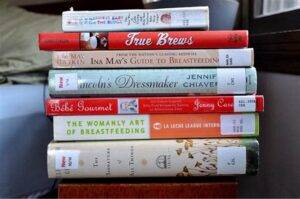The transition **into parenthood is great, but it comes with struggles and added responsibilities. New mothers face the challenging task of raising a child without much ease. However, they can seek guidance from numerous books that are helpful in managing motherhood.
Parenting books are one such resource that offers valuable guidance. They cover a broad range of topics and are written by experts. They offer practical insights that new moms can put into practice immediately. These books are go-to resources, especially for a first-time mom.
Get these five parenting books in your library. These top five selections are must-haves for any mother who wants to be a successful parent.

The Whole-Brain Child: 12 Revolutionary Strategies to Nurture Your Child’s Developing Mind by Daniel J. Siegel and Tina Payne Bryson
Parenting can be overwhelming, especially for new moms. The book is an excellent source that provides twelve strategies to help them understand how their child’s mind develops and how they can foster healthy and happy individuals.
This book is a great resource for navigating the parenting journey. The authors clearly explain the scientific information behind these strategies in a way the reader can understand. They also offer practical advice on how to implement them in your daily life.
This book attributes an acceptance approach that is backed by neuroscience. What part of the brain is activated mid-tantrum will determine how we confront it.
The book comes with other topics, including

- One strategy outlined in the book is ‘Connect and Redirect.’ This involves bonding with your child on an emotional level before redirecting their behavior. It helps kids understand how to manage their emotions and react well when asked to change course.
- Giving your children the opportunity to understand their emotions is an excellent strategy that can help them cope. This method, known as ‘Name it to Tame it,’ allows them to learn how to process and manage their feelings healthily.
With this approach, they can start expressing their emotions productively over time.
- Parent-child relationships can be strengthened by keeping open channels of communication. The Engage, Don’t Enrage method assists parents in engaging with their children constructively rather than flying off the handle in rage.
With this technique, parents create a solid foundation for an enduring connection with their kids. This enables children to feel heard and valued.
The Happiest Baby on the Block: The New Way to Calm Crying and Help Your Newborn Baby Sleep Longer: by Harvey Karp
This book helps new moms to learn how to calm their crying babies and let them sleep longer. The book provides the 5 S method — side-stomach, swaddling, swinging, sucking, and shushing. These techniques mimic the womb to help soothe a fussy baby.
The book comes with other topics, including:
- The Fourth Trimester: A period shortly after birth when babies need time to adapt to the world beyond the womb. The book makes a good guide to fostering a sense of comfort and assurance for your newborn during this stage.
- The Cuddle Cure: This technique involves holding your baby close to your body to soothe them. The book explains how it can help regulate a baby’s breathing and heart rate and promote healthy development.
- The Calming Reflex: This is a natural reflex that helps babies calm down. The book explains how to trigger this reflex to make your baby relax.
No-Drama Discipline: The Whole-Brain Way to Calm the Chaos and Nurture Your Child’s Developing Mind by Daniel J. Siegel and Tina Payne Bryson
This book presents a dramatic approach to discipline that focuses on nurturing a child’s developing mind rather than chastising them for wrongdoing. The importance of fostering relationships and understanding in discipline is highlighted.
The topics included are:
- The Discipline Problem: A fresh approach to discipline is introduced, which promotes healthy growth while highlighting the reasons why conventional discipline methods have failed.
- The Science of Discipline: An analysis of the impact of discipline on a child’s brain growth and ways in which parents can make use of this information to effectively implement disciplinary measures.
- The Four Components of Discipline: This section presents four factors of discipline to help children develop tone –discipline and emotional regulation. These factors are connection, communication, redirection, and reflection.
- The No-Drama Discipline Toolbox: This section provides practical tools and strategies for parents to use in real-life discipline situations. These tools include active listening, validating feelings, setting limits, and problem-solving.

The Baby Book: Everything You Need to Know About Your Baby from Birth to Age Two by William Sears and Martha Sears
The Baby Book provides a comprehensive approach to caring for newborns up to two years old. Written by a pediatrician and his wife, this guide covers a range of topics including feeding, diapering, sleeping patterns, and development milestones.
With an emphasis on holistic parenting, The Baby Book promotes the significance of responsive and attachment parenting for optimal growth and development. This book provides great content for all your parenting needs.
The topics included are:
- Attachment Parenting: it aims to establish a strong relationship between the parent and child through breastfeeding, co-sleeping, and baby-wearing.
- Feeding: Mothers can provide nourishment to their infants, including breastfeeding, administering formula, and incorporating solid foods into their diet.
- This book offers practical tips on baby feeding and information on common feeding issues, such as colic and reflux.
- Sleep: It covers all aspects of baby sleep, such as establishing a sleep routine and creating a safe sleep environment. Also, it deals with sleep issues such as sleep regression and night waking.
Simplicity Parenting: Using the Extraordinary Power of Less to Raise Calmer, Happier, and More Secure Kids by Kim John Payne and Lisa M. Ross
This is a book for new mothers who want to rationalize their lives for a more peaceful and purposeful home environment. It presents a philosophy of simple parenting that emphasizes limiting distractions to create a predictable and nurturing home environment.
Topics covered in the book include:
- The Power of Simplicity: The book provides tips and advice to simplify a child’s life, including decluttering, simplifying routines, and reducing media exposure.
- Rhythm and Ritual: This section emphasizes the significance of creating predictable and nurturing measures and rituals in a child’s life. It gives tips for creating diurnal and daily measures, and special rituals for leaves and mileposts.
- Filtering Out the Adult World: This section emphasizes the significance of guarding children against adult stresses. It provides practical tips for creating a sheltered home setting, such as limiting media exposure.

The Importance of Reading Parenting Books
Being a first-time parent is joyful and exciting, but it can also be daunting. With tons of new responsibilities, it’s natural to lack self-confidence in caring for your baby. Over time, moms will eventually know how to deal with the difficulties that come along the way.
However, reading parenting books is a great way to gain knowledge and confidence in parenting abilities. These books provide insights into child-rearing, from the early stages of infancy until the teenage years.
Parenting books help new moms understand the developmental needs of their babies to foster a strong bond and discover effective strategies for managing behavior and discipline.
Aside from offering relevant advice, books that tackle parenting afford emotional assistance. Since parenting takes a toll on emotional disposition, it is a must to take care of the mental and physical aspects of one’s self, as well as the child’s well-being.
How to Choose the Best Parenting Books for Your Child’s Age and Developmental Stage?
Choosing a great parenting book for the child’s age and developmental stage can be overwhelming. There are tons of options available in the market. Here are some tips to help you choose the best parenting book:
- Select books specifically written for the child’s age and developmental stage. For example, a book on infant care will not be appropriate for a toddler.
- Check the credentials of the author. Choose books authored by experts in psychology and child development. Authors should have the necessary qualifications, like a degree in child psychology.
- Read reviews from other mothers who have read the book. Search for reviews with useful information, easy-to-read, and how helpful the book was.
- Look for evidence-based information. Select books that are evidence-based and backed by scientific research. Steer away from books that promote unfounded theories or unsupported claims.
- Consider your parenting style. Select a book that coordinates with your parenting approach and technique.
- Steer away from books that encourage fear-mongering. Choose books that provide practical advice and support.
Must-Read Parenting Books For Every Mom
From understanding how the child’s brain develops to generating a peaceful and conducive home environment, these parenting books provide practical advice and strategies for managing the challenges of parenthood.



